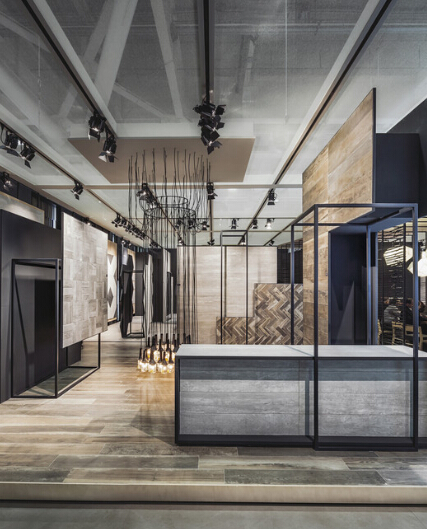When an international brand asks for a new stand design usually is to mark a shift in perception. As part of an ongoing expansion strategy, in 2011 the Turkish Kale Group established Kale Italia as qualified hub for all the western operations. Opening to a world of possibilities, this sensible switch – along with a roster of hi-quality design-edge new products – brought fresh new energy and ambitions to raise the brand value.
Cersaie 2014 resulted to be the first official worldwide presentation of this new venture. A 700 sqm stand had for the first time to gather five different brands belonging to the Kale Group, with the aim to show clearly its presence in any segment of the market.
The design agency of Architect Paolo Cesaretti - in charge of the new stand design and visual communication - decided to stage the tangible energy of this moment in the Group’s life through a vibrant outer skin tying together the five brands. In balance between analogic and digital, the skin was solid but transparent, enclosing but lighting. A digital pattern made of a natural material, thousands of MDF blocks.
The skin - an attracting element from outside - left edgeless the space inside. Here a central spine - hosting services such as reception, business lounge, meeting rooms, private offices, storage rooms - was organizing and connecting all the exhibition areas. Inside the stand all the actions were focused on directing the attention of the visitor to the displays. With a no lost space attitude, simple fluid paths invited the visitors to discover and stop. Clear perception meant clear information along with a remarkable experience.
Two main different ways of displaying were designed. The From ambient to hype type - discarding the traditional idea of the room-replica display - consisted in a wireframe cage organizing shifted ceramic surfaces. Hosting moodish and stylish sets evoking interior decor solutions, it was used mainly for products belonging to the residential segment. The Extended display type was instead intended for large extensions of product display and consisted in plywood panel+platform display units. Used in all the brand areas for products with a more technical vocation.
Additionally, bespoke display types were studied for the Edilgres hi-end collections. Here the ceramics became a landscape of sculptural surfaces organized around two chandelier-like installations made of hundreds of workshop lamps.
